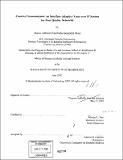Convivo communicator : an interface-adaptive voice over IP system for poor quality networks
Author(s)
Escobedo Gonzalez Maiz, Marco Antonio, 1976-
DownloadFull printable version (11.59Mb)
Other Contributors
Massachusetts Institute of Technology. Dept. of Architecture. Program In Media Arts and Sciences.
Advisor
Michael L. Best.
Terms of use
Metadata
Show full item recordAbstract
This thesis presents Convivo, a VoIP system designed to provide reliable voice communication for poor quality networks, especially those found in rural areas of the developing world. Convivo introduces an original approach to maintain voice communication interaction in presence of poor network performance: an Interface-Adaptation mechanism that suggests adjusting the application user interface to conform to one of three voice communication modalities (full duplex, half duplex, and voice messaging). The thesis proposes that changes in communication modality are an option to sustain voice communication interaction despite poor network performance. The goals of the changes in communication modality are to reduce the impact of high latency and low bandwidth on voice communication interaction, to facilitate turn taking for a high latency connection, and to sustain voice communication for extremely low bandwidth or high error links. The system was tested via a user study in Bohechio, a small village in the Dominican Republic. The study found that Interface-Adaptation helped users to maintain voice communication interaction when network performance degrades. Transitions from full duplex to voice messaging were found particularly valuable. Initial results suggest that as users get more experience with the application they would like to manually control transitions based on feedback provided by the application and their own perceived voice quality.
Description
Thesis (S.M.)--Massachusetts Institute of Technology, School of Architecture and Planning, Program in Media Arts and Sciences, 2002. Includes bibliographical references (leaves 100-102).
Date issued
2002Department
Program in Media Arts and Sciences (Massachusetts Institute of Technology)Publisher
Massachusetts Institute of Technology
Keywords
Architecture. Program In Media Arts and Sciences.